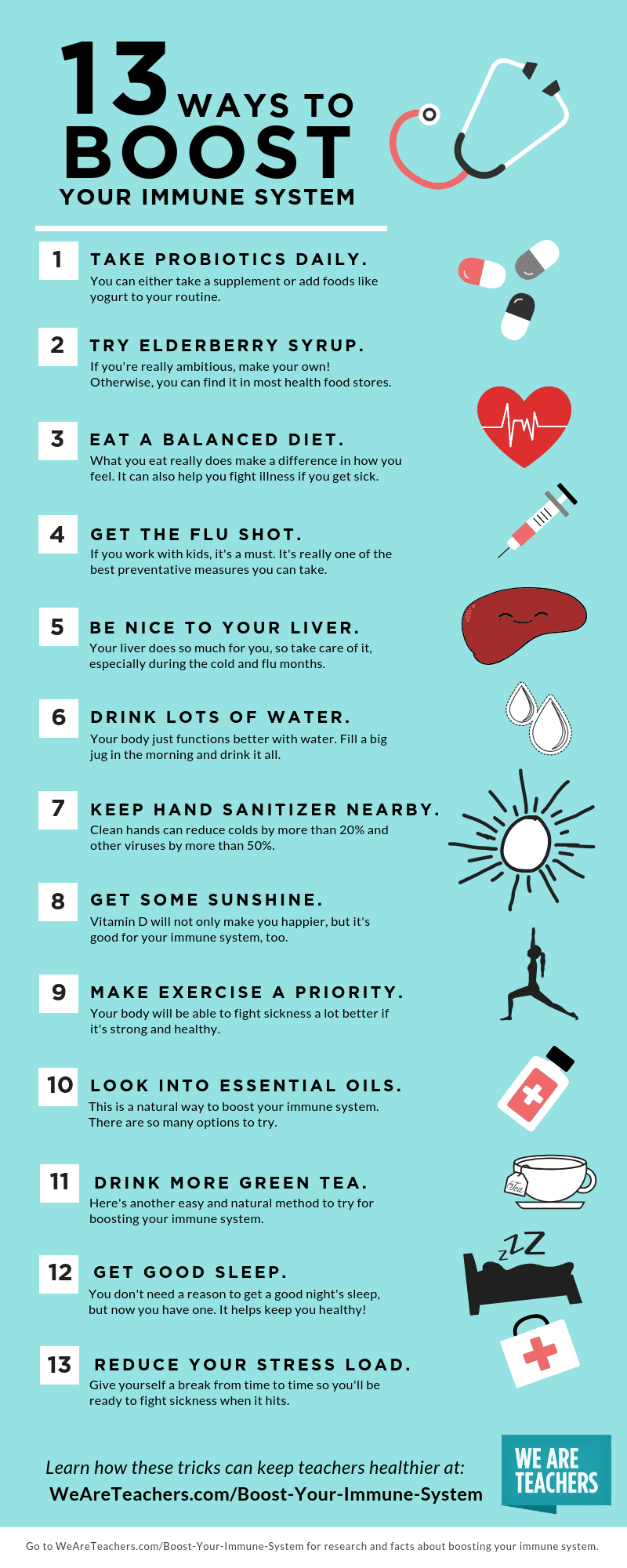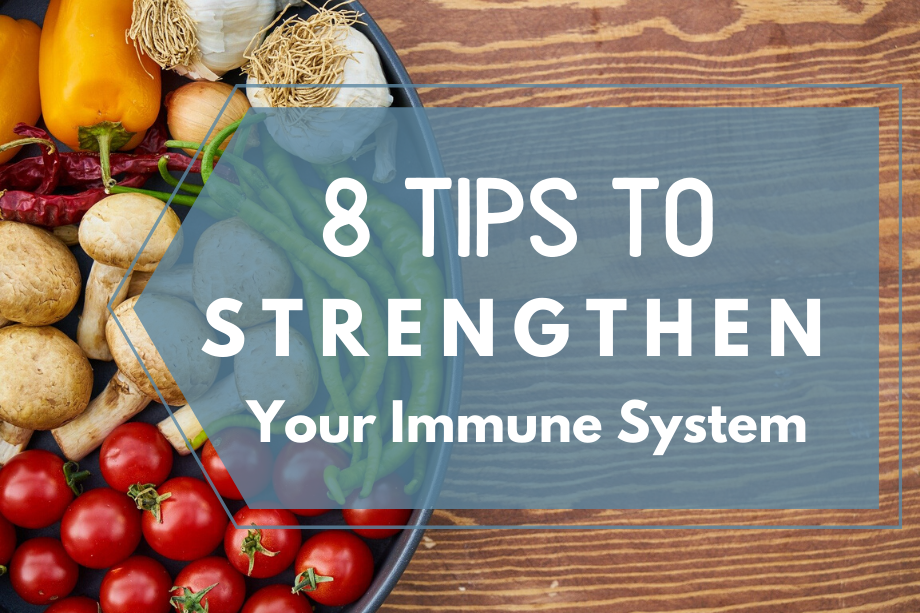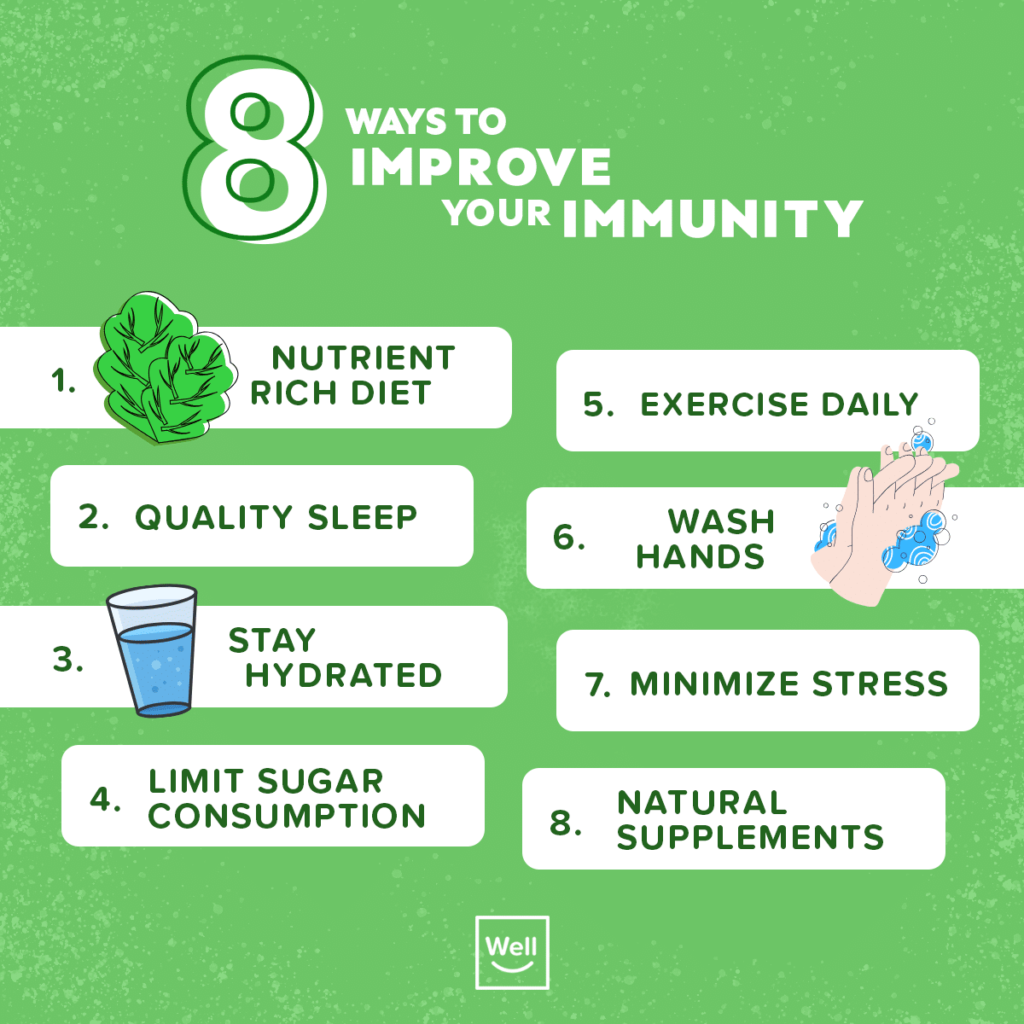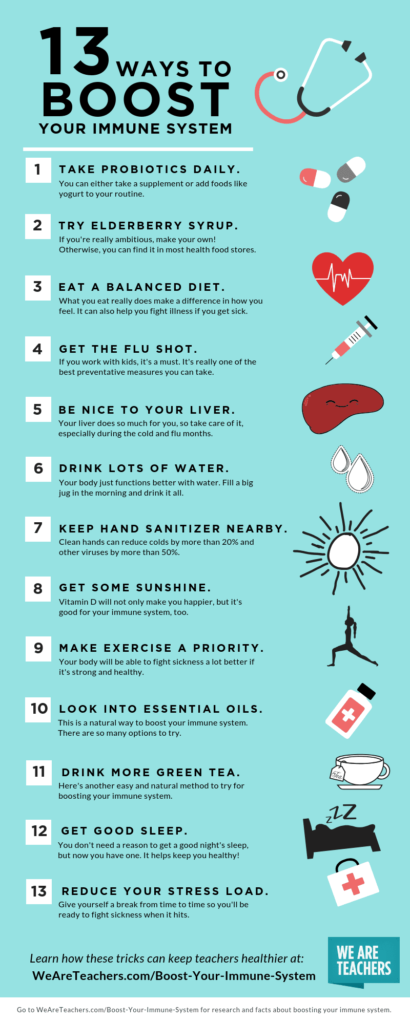
In today’s fast-paced world, taking care of our health has become more important than ever. We often find ourselves wondering, “How can I boost my immune system?” With a plethora of information available, it can be overwhelming to navigate through various strategies and tips. Luckily, this article aims to provide you with simple yet effective ways to strengthen your immune system naturally. From incorporating nutrient-rich foods into your diet to adopting a regular exercise routine, you’ll discover practical steps to help fortify your body’s defense against illnesses and enjoy a healthier lifestyle. So, let’s dive in and explore how you can give your immune system the boost it needs!
Diet and Nutrition
Eat a balanced diet
Maintaining a balanced diet is a crucial aspect of boosting your immune system. Consuming a variety of foods from different food groups ensures that you receive all the necessary nutrients to support your body’s defense mechanisms. Include plenty of fruits, vegetables, whole grains, lean proteins, and healthy fats in your meals. Each food group contributes essential vitamins, minerals, antioxidants, and fiber that aid in strengthening your immune system.
Include immune-boosting foods
Certain foods contain powerful antioxidants, vitamins, and minerals that can enhance your immune system’s functioning. Incorporating these immune-boosting foods into your diet can provide a significant advantage in warding off illnesses. Some examples of immune-boosting foods include citrus fruits like oranges and grapefruits, berries, leafy greens, garlic, ginger, turmeric, almonds, yogurt, and green tea. These foods contain nutrients that have been shown to support immune system health and prevent infections.
Stay hydrated
Proper hydration is essential for a healthy immune system. Water plays a crucial role in regulating body temperature, aiding digestion, transporting nutrients, and flushing out toxins. It is recommended to drink at least 8 glasses (64 ounces) of water per day. Additionally, include hydrating foods and beverages such as watermelon, cucumbers, herbal teas, and homemade fruit-infused water in your diet. Staying hydrated helps your immune system function optimally, reducing the risk of illness.
Limit processed foods and sugar
Excessive consumption of processed foods and added sugars can negatively impact your immune system. Processed foods often lack essential nutrients and can lead to inflammation, making you more susceptible to infections. Similarly, high sugar intake can weaken immune cells, impairing their ability to combat harmful pathogens. It is advisable to limit processed foods, such as fast food, sugary snacks, and sodas, and opt for whole, unprocessed foods instead. Choose natural sources of sugar like fruits to satisfy your sweet cravings.
Consider supplements
While a well-balanced diet should provide most of the nutrients your immune system needs, supplements can complement your diet if necessary. Consult with a healthcare professional to determine if specific supplements are suitable for you. Vitamin C, vitamin D, zinc, and probiotics are examples of supplements that have shown potential in boosting the immune system. However, it is important to remember that supplements should never replace a nutrient-rich diet and should be used as an additional measure when needed.
Exercise and Physical Activity
Engage in regular exercise
Regular exercise contributes to overall health and plays a significant role in strengthening the immune system. Physical activity helps improve cardiovascular health, enhances blood circulation, and increases the production of antibodies and white blood cells, which are crucial for fighting off infections. Aim for at least 150 minutes of moderate-intensity exercise or 75 minutes of vigorous exercise per week. Incorporate activities like brisk walks, jogging, cycling, swimming, or joining fitness classes to improve your immune system’s resilience.
Choose a variety of exercises
To maximize the benefits of exercise for your immune system, it is important to engage in a variety of exercises. Mixing cardio exercises, strength training, and flexibility exercises can improve different aspects of your immune system. Cardio workouts increase blood flow, strength training builds muscle mass, and flexibility exercises help maintain joint health. Incorporate activities like running, weightlifting, yoga, Pilates, dancing, or tai chi into your routine to ensure a well-rounded approach to immune system support.
Maintain a healthy weight
Maintaining a healthy weight is vital for your immune system. Being overweight or obese can impair immune function, making it harder for your body to fight off infections. Strive for a balanced diet and regular exercise to achieve and maintain a healthy weight. This will not only reduce the risk of chronic diseases but also support the proper functioning of your immune system. Remember, a healthy body weight and an active lifestyle go hand in hand when it comes to boosting your immune system.

This image is property of www.mdanderson.org.
Get Adequate Sleep
Establish a bedtime routine
Establishing a consistent bedtime routine can greatly improve the quality of your sleep. Create a relaxing atmosphere before bed by engaging in activities like reading, taking a warm bath, or practicing gentle stretches. By following a routine, your body will begin to recognize these cues and prepare for rest, enabling you to fall asleep more easily.
Create a sleep-friendly environment
Creating a sleep-friendly environment can promote better sleep. Ensure your bedroom is cool, dark, and quiet. Use curtains or blinds to block out any intrusive light, invest in a comfortable mattress and pillows, and consider using white noise or earplugs to drown out any noise that may disrupt your sleep. By optimizing your sleep environment, you can enhance the quality of your rest and consequently support your immune system.
Stick to a consistent sleep schedule
Maintaining a consistent sleep schedule is beneficial for your immune system. Try to go to bed and wake up at the same time every day, even on weekends. This helps regulate your body’s internal clock, known as the circadian rhythm, which influences various physiological processes, including immune function. Consistency in your sleep schedule allows your body to optimize its immune responses and keep you healthy.
Avoid caffeine and electronics before bed
Caffeine is a stimulant that can disrupt sleep, so it is important to avoid consuming it close to bedtime. Instead, opt for caffeine-free herbal teas or warm milk, which can promote relaxation. Additionally, the blue light emitted by electronic devices like smartphones, tablets, and laptops can interfere with your body’s production of melatonin, a hormone that regulates sleep. Aim to limit screen time at least one hour before bedtime to improve the quality of your sleep and support your immune system.
Manage Stress Levels
Practice relaxation techniques
Practicing relaxation techniques can help decrease stress levels and positively impact your immune system. Techniques such as deep breathing, progressive muscle relaxation, meditation, and mindfulness have been shown to reduce stress hormones and promote a sense of calm. Incorporate these techniques into your daily routine, even if it’s just for a few minutes, to help manage stress and support your immune system’s function.
Engage in stress-reducing activities
Engaging in activities that you find enjoyable and relaxing can help alleviate stress. Activities like listening to music, reading, taking nature walks, gardening, practicing hobbies, or spending quality time with loved ones can have a positive impact on your emotional well-being. By reducing stress, you can enhance your immune system’s resilience and protect yourself from illnesses.
Get regular exercise
Exercise not only benefits your physical health but also plays a crucial role in managing stress levels. Physical activity stimulates the release of endorphins, often referred to as “feel-good” hormones, which can elevate your mood and reduce stress. Engaging in regular exercise can help combat stress, improve your mental well-being, and consequently support your immune system’s strength.
Maintain a support system
Building and maintaining a support system can provide you with emotional support, reducing stress levels. Surround yourself with friends, family, or a community that you can trust and turn to for support during challenging times. Having someone to talk to, share your feelings with, or seek guidance from can significantly impact your stress levels and overall mental health, ultimately benefiting your immune system.

This image is property of www.orthocarolina.com.
Stay Hygienic
Wash hands regularly
Proper hand hygiene is crucial in preventing the spread of germs and keeping yourself healthy. Wash your hands thoroughly with soap and water for at least 20 seconds, especially after using the restroom, before preparing or eating food, and after being in public places. If soap and water are not available, use hand sanitizer that contains at least 60% alcohol. Making handwashing a regular habit significantly reduces the risk of infections and supports your immune system’s defenses.
Practice proper coughing and sneezing etiquette
When you cough or sneeze, practice proper coughing and sneezing etiquette to prevent the spread of germs. Cover your mouth and nose with a tissue or the inside of your elbow, rather than your hands. Dispose of used tissues immediately and wash your hands thoroughly afterward. By following these practices, you minimize the chances of spreading germs and contracting illnesses, contributing to a healthier immune system.
Keep personal items clean
Regularly cleaning personal items, especially those you frequently touch, can help minimize the transfer of germs. Clean and disinfect frequently touched surfaces like doorknobs, light switches, cell phones, keyboards, and remote controls. Use EPA-approved disinfectants or a mixture of water and soap for cleaning. By maintaining cleanliness, you create an environment that is less conducive to the survival and spread of harmful pathogens.
Avoid close contact with sick individuals
Minimizing close contact with individuals who are sick or displaying symptoms of illness is vital in protecting yourself from infections. If you encounter someone who is sick, maintain a safe distance, avoid touching your face, and practice good hygiene habits. By limiting exposure to sick individuals, you reduce the risk of getting infected and subsequently support your immune system’s ability to function optimally.
Avoid Smoking and Excessive Alcohol
Quit smoking
Smoking weakens the immune system and increases the risk of various health conditions. The chemicals in tobacco smoke can impair the immune system’s ability to fight off infections, leaving you more susceptible to illnesses. Quitting smoking is one of the best things you can do to boost your immune system and improve your overall health. Seek support from healthcare professionals, support groups, or quit-smoking programs to help you successfully quit this harmful habit.
Drink alcohol in moderation or avoid it altogether
While moderate alcohol consumption may not be harmful to your immune system, excessive alcohol intake can weaken your body’s defenses. Heavy drinking impairs the immune system’s ability to combat infections and leads to increased inflammation throughout the body. It is recommended to limit alcohol intake to moderate levels, which means up to one drink per day for women and up to two drinks per day for men. However, for some individuals, avoiding alcohol altogether may be the best choice for maintaining optimal immune system function.

This image is property of wellhealthcenters.com.
Stay Active and Social
Engage in social activities
Engaging in social activities is not only enjoyable but also beneficial for your immune system. Social interactions can help reduce stress, boost mood, and enhance overall well-being. Whether it’s spending time with friends, joining clubs or organizations, or participating in community events, staying socially active can have a positive impact on your immune system’s resilience.
Volunteer or help others
Helping others through volunteer work or acts of kindness has been associated with improved immune system function. Engaging in activities that contribute to the well-being of others can give you a sense of purpose and fulfillment, reducing stress levels and benefiting your overall health. Look for volunteer opportunities in your community or find ways to assist those in need. By giving back, you not only help others but also support your immune system.
Maintain a positive outlook
Maintaining a positive outlook and optimistic mindset can significantly impact your immune system. Studies have shown that individuals with positive attitudes are more resilient to illnesses and heal faster when they do get sick. Practice gratitude, surround yourself with positivity, and focus on the good things in life. By cultivating a positive mindset, you can strengthen your immune system and enhance your overall well-being.
Reduce Exposure to Environmental Toxins
Avoid exposure to pollutants
Reducing your exposure to environmental pollutants is vital for maintaining a strong immune system. Air pollution, chemicals, and toxins found in certain environments can weaken your body’s defenses and make you more susceptible to infections. Avoid spending extended periods in heavily polluted areas and ensure proper ventilation in your living space. If you live in an urban area with higher pollution levels, consider using air purifiers or wearing masks when necessary to minimize your exposure.
Use natural cleaning products
Traditional cleaning products often contain harsh chemicals that can be harmful to your immune system and overall health. Switching to natural and environmentally friendly cleaning products reduces your exposure to toxins. Look for cleaning products labeled as eco-friendly, non-toxic, or made with natural ingredients. You can even make your own cleaning solutions at home using ingredients like vinegar, baking soda, and essential oils. By opting for natural cleaning products, you create a safer environment for yourself and support your immune system.
Minimize contact with harmful chemicals
In your day-to-day life, try to minimize contact with harmful chemicals found in certain products. This includes avoiding the use of pesticides, herbicides, and other chemical-laden products both inside and outside your home. Opt for organic food and personal care products, as well as environmentally friendly household items. By reducing your exposure to harmful chemicals, you can support your immune system’s ability to ward off illnesses and maintain optimal health.

This image is property of www.weareteachers.com.
Maintain Good Hydration
Drink ample water
Proper hydration is key to supporting your immune system. Water helps transport nutrients, remove waste, and supports the production of immune cells and antibodies. Make it a habit to drink ample water throughout the day, aiming for at least 8 glasses (64 ounces). Keep a water bottle with you at all times as a reminder to stay hydrated. If you find plain water boring, try infusing it with fruits, herbs, or adding a splash of natural fruit juice to enhance the flavor.
Consume hydrating foods and beverages
In addition to drinking water, you can also consume hydrating foods and beverages to support your hydration. Incorporate foods with high water content into your diet, such as watermelon, cucumbers, tomatoes, oranges, and grapes. Herbal teas, coconut water, and homemade smoothies can also contribute to your overall hydration. By consuming hydrating foods and beverages, you ensure your body has the necessary fluids to support immune function and overall health.
Take Care of Your Mental Health
Manage stress and anxiety
Taking care of your mental health is crucial for overall well-being, including immune system health. Chronic stress and anxiety can weaken the immune system, leaving you more susceptible to infections. Prioritize activities that help you manage stress, such as exercise, relaxation techniques, or engaging in hobbies that bring you joy. By managing stress and anxiety effectively, you support your immune system’s strength and vitality.
Seek therapy or counseling when needed
If you’re struggling with mental health issues that affect your day-to-day life, seeking therapy or counseling can be tremendously beneficial. A mental health professional can provide guidance, support, and coping strategies tailored to your specific needs. Therapy can help you manage stress, anxiety, depression, or other conditions that may weaken your immune system. Don’t hesitate to reach out for help when needed.
Practice mindfulness or meditation
Regularly practicing mindfulness or meditation can have a positive impact on your mental health and immune system. These practices help you stay present in the moment, improve self-awareness, and reduce stress levels. Incorporate techniques like deep breathing exercises, guided meditation, or mindful walking into your daily routine. By nurturing your mental well-being through mindfulness, you create a harmonious environment for your immune system to thrive.
Taking care of your immune system is an ongoing process that involves adopting healthy lifestyle habits and prioritizing your overall well-being. By following these guidelines and incorporating them into your daily routine, you can strengthen your immune system, reduce the risk of illness, and enjoy improved health and vitality. Remember, small changes can make a big difference, so start implementing these practices today and reap the rewards of a resilient immune system. Stay healthy, stay well!

This image is property of www.cedars-sinai.org.